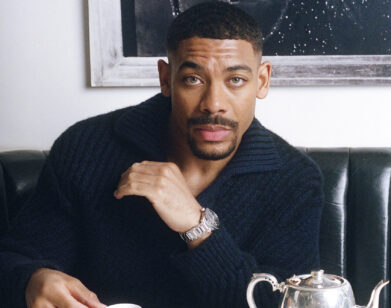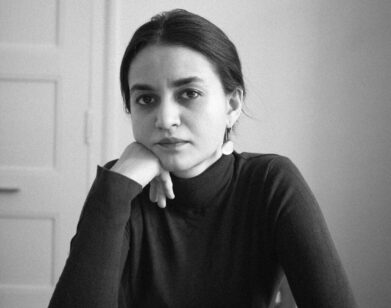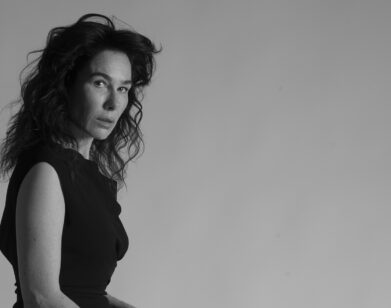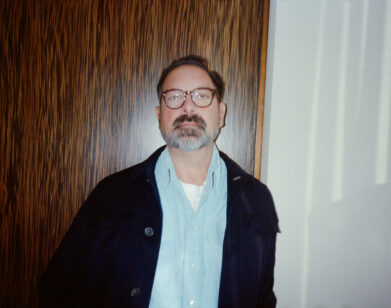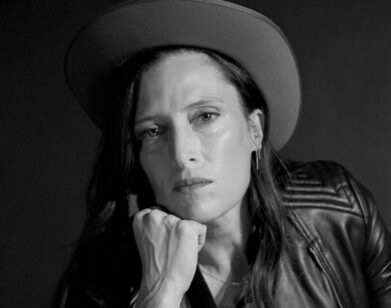Vincent Piazza, Honorary Jersey Boy
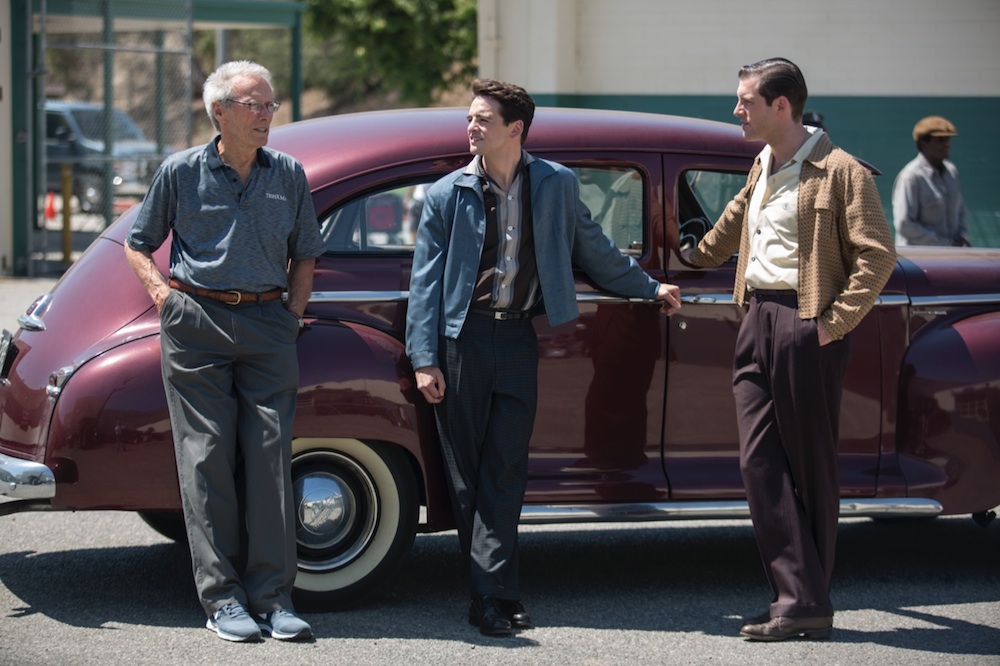
ABOVE: (LEFT TO RIGHT): CLINT EASTWOOD, VINCENT PIAZZA, AND MICHAEL LOMENDA ON THE SET OF JERSEY BOYS. PHOTO COURTESY OF WARNER BROS.
Vincent Piazza doesn’t sing, dance, or play the guitar. Or at least he didn’t until Clint Eastwood cast him in his film adaptation of the musical Jersey Boys. Of the four actors who portray the members of the Four Seasons, the 1950s falsetto boy band from New Jersey at the center of the story, Piazza is the only one who was never in a stage production of the show. “When I found out that the other three guys were from the musical, I called my agent,” Piazza tells us. “I was like, ‘Rhonda, I think they got the wrong guy.'” They didn’t; if anything, as the charismatic but childishly selfish Tommy DeVito, Piazza steals the show.
A native of Queens New York, Piazza is most famous for his role on another Garden State-based project, HBO’s Prohibition drama Boardwalk Empire. As in Jersey Boys, in Boardwalk Piazza also plays a nonfictional figure, the gangster Lucky Luciano. When it comes to working with a man as famous as Clint Eastwood, Piazza explains that he “had the best warm-up when I was cast in Boardwalk Empire,” he recalls. After the show’s pilot, which was directed by Marin Scorsese, “Every question was, ‘What’s Martin Scorsese like?’ Now,” he continues, “the go-to question is, ‘What’s it like to work with Clint Eastwood?'”
EMMA BROWN: Can you first tell me a little bit about how you got involved involved in the film—did you have to audition?
VINCENT PIAZZA: Initially, the film was going to go a year prior to when it did. At that point, I was asked to audition for it and I went in and I met the then director for it, John Favreau. I got a call from my agent, and of course read online that the film was on hold for the time being, and just went, “Well, okay. Those are the breaks.” Then I get a call maybe six months, nine months later from my agent saying, “It’s back to life and there’s a new director—Clint Eastwood is attached to direct it. The only problem,” she goes, “is that it looks like it’s just going to be people from the musical, but it’s worth making a tape.” So I went in and I met Geoff Miclat, the casting director, and we made a tape and about a week later I found out I had the role.
BROWN: Your character, Tommy DeVito, is still alive—have you met him?
PIAZZA: No. At the time, when I was just getting into the work, I had so much to juggle between the script and understanding the character, I felt like I might freak myself out asking to meet the real guy.
BROWN: Tommy is very charming, but he also does some pretty despicable stuff. Do you think he was aware of what he was doing to the rest of the group?
PIAZZA: I think he had these vices all along, but when you’re not making much money, it’s hard to gamble a lot, it’s hard to spend a lot—you do the best you can with what you have. But when success and fame arrive, it magnifies one’s great qualities and it magnifies one’s negative qualities. So I just think it’s just who he is. It’s a sickness.
BROWN: To what extent do you think he should be held accountable for his actions? It’s easy to let him off the hook with an, “Oh, but he didn’t have bad intentions.”
PIAZZA: I think he was well intentioned. It’s hard to keep score in a relationship like that—to go through the wins and the losses and count it. Sure, the end result was a terrible financial crisis for the group, and certainly Frankie Valli, but was it worth it? That sounds like something only the real guys can answer. Certainly in the movie they leave it that the best time was getting to that place, not necessarily being in that place.
BROWN: Did you get really sick of the Four Seasons’ songs?
PIAZZA: [laughs] I cannot say I haven’t. I cannot speak for the people closest to me. Certainly, I enjoyed the music. I was really surprised; I wasn’t aware of all the hits that they were responsible for, so it just felt like the gift that keeps on giving.
BROWN: Were you singing them off set?
PIAZZA: Oh, yeah. Singing them, humming them, whistling them. It’s infectious. It almost becomes this weird river in your head: you’re idle for a moment and then [hums song]. Some rhythm comes in and you’re like, “Oh, where did that come from?”
BROWN: Have you stopped doing that now that you’ve finished filming?
PIAZZA: Nope. [laughs] I can honestly say that every now and then I’ll just be walking somewhere and a lyric or a few bars of a song come into my head. Some of those things are hard to shake. Which, hopefully bodes well for the movie, it certainly has for the musical, right?
BROWN: I actually haven’t seen the stage production, just the film.
PIAZZA: I got to see the musical not long before we began filming the movie. The difference is, if you ever get to see the musical, the immediacy of the stage production. Everything is right in your face and the music and the scenes really build in a certain way that benefits stage production. The movie breathes more. I feel like you really get to know the guys a little bit better, you get to know the characters a little bit better through the movie.
BROWN: Do people sing along when they go to the Broadway production?
PIAZZA: Yeah, it’s amazing. I actually took my girlfriend and my parents to go see the musical. We were like, “Oh, let’s make a night of it. Let’s go to dinner and we’ll see the show.” My parents were tapping their legs and I could see my mother mouthing some of the words. Then we look around and there were like women standing, flailing in some of the rows, still living in that time as if Frankie Valli was actually on stage. It was really something to see. People were out of their seats. Mind you, this is 10 years into the run of the musical, so it’s not like it’s just breaking out. I had no idea it had that kind of connection with an audience; maybe just a generational thing.
BROWN: Was it strange to break the fourth wall in the film?
PIAZZA: Yes, especially because of how it happened. I had read the script so many times getting ready for it, and there were a number of scenes when I mapped out what I needed to do. I was looking at [those parts] as narration: this will be in a booth that we’ll record months from now. But I’d read it just to read it to do my work. So the second day of shooting, we were going to shoot some of those inserts of me walking to the prison bus or me walking out of prison. I was relieved because the first day was really intense. I said “Today’s a light day, this will be good.” Then Mr. Eastwood comes over to me and he was like, “Hey Vince, what do you think about, just as you’re walking, turning to the camera and delivering your narration. I want you to deliver the narration right to the camera.” In my head, I’m like, “My god, do I know the narration?” I’m looking at the sides and I’m like, “Wow, I actually know the narration, but this is a little strange.” Steve Campanelli was the camera operators and Tom Stern was the DP, and these guys have worked with Clint for many, many years. The way the camera moved was this elaborate swooping crane shot, and I had to keep eyes on the camera wherever I was going and come in and out of the scene. It was really fun exercise, but definitely the first time I heard that that’s what was going to happen, which was on set the day we were doing it, it was a little shocking.
BROWN: Did it feel uncomfortable to actually make eye contact with the camera—like you were doing something you shouldn’t be doing?
PIAZZA: It was actually a great relief. I think so many times I find myself avoiding it, and finally it was like, “All right, let me talk to you now.”
BROWN: As a New Yorker, do you remember the first time you crossed the state line into New Jersey?
PIAZZA: Yeah, I got a speeding ticket. [laughs] New Jersey, we’ve had a very tumultuous relationship, that state. It seems like, from my work standpoint, it just beckons me. Three of my biggest things have been about New Jersey characters and families. Rocket Science, Boardwalk, I also did Sopranos and now this, so four. I don’t know what my connection is with New Jersey, but whenever I pass through there it’s very funny.
BROWN: Do you give a little prayer of thanks?
PIAZZA: Well, I guess there’s a prayer of thanks. But I either get lost, I get a speeding ticket, or I can’t figure out jug handles. I haven’t quite figured out the geography of New Jersey.
BROWN: What’s a jug handle?
PIAZZA: They have these streets that are designed to get you in different directions. Now you’re used to a roundabout, which is like you’re in a circle and you can turn off on to any three or four roads, or five. But in New Jersey, they are called jug handles so you can use it to turn around for a real specific direction. It’s just escaped me.
BROWN: I know you didn’t take your first acting class until you were 24. What made you sign up at that age?
PIAZZA: I tried a number of different things before acting—it was something that I had never thought out prior to other occupations. I was in finance for a bit and a guy I’d worked with for a number of years, he was really a mentor to me, and I guess I was more of the office clown. I would end up putting on these sketches of what happened in our meetings for the day—just funny stuff—and we would end up having a laugh and he kept telling me, “Man, you’re wasting your time at this business, you should be an actor.” We were doing quite well for ourselves, and he had said it enough times that it left a mark with me. But he passed away suddenly in a car accident, and I rethought things. I was at that age where bouts with mortality were really powerful. Not that they aren’t now, but certainly then it hit me hard and I just wanted changed the way I looked at life. I said, “Let me just see what acting’s like, just to try it.” And I tried it, and I never went back to finance. Luckily it happened in that order, because finance taught me a lot about work ethic, responsibility, and things like that. I knew if [acting] were that easy, everyone would be doing it. So I just really wanted to get rooted and build a good craft and spend years doing it.
BROWN: How did your parents react when you told them that you were quitting finance to become an actor? Did they discourage you: “What’s wrong with you? Don’t do that!”
PIAZZA: More palpable than any type of reaction like that was just the silence. [laughs] They were really supportive but they were skeptical: “He’ll come around. It’s just a phase.” What’s funny is that I would do these plays and they would always come. I had worked on a Shakespeare production out in Central Park and they were like, “Oh, very nice.” I was like, “But it’s Shakespeare. It’s some really great stuff!” Then I got cast in an episode of Law and Order where I was hit over the head and killed in the teaser, and you would think they hit the lotto. “Oh my god, he’s on TV.” It was the funniest reaction. They were so proud. All the work I had done—the other plays—and that was the one that they grasped on to.
BROWN: What was your first paid acting job?
PIAZZA: It’s hard to pin one, because I had done so many plays that paid, like, 100 dollars for the month—for an equity showcase, I’d get a stipend of 50 bucks, 100 bucks. But the first meaningful paycheck that I got on a job was through Rocket Science (2007), which was an independent film I had done. I auditioned for that by paying the casting director 30 dollars to do a monologue.
BROWN: Oh yes, I’ve heard of this. You pay and then you can just perform in front of a number of casting directors as practice and they give you feedback.
PIAZZA: Yeah, exactly. I met Nadia Lubbe, and thank god I did. I had worked on a monologue from a play, and I put it up for her. And she goes, “I’m about to cast this movie, and I think you might be right for it. Can I get in touch with you?” I gave her the information and she sent me the sides and then Rocket Science happened.
BROWN: I have to ask you a bit about Boardwalk Empire, which comes back in September, correct?
PIAZZA: Yeah, we finish [filming] it mid-August. It’s the final season.
BROWN: Are really you sad or ready to move on to the next thing?
PIAZZA: I was, in my mind, very neat and tidy: this year will kind of be the year I get to see things through, Jersey Boys will come out and I get to finish up Boardwalk. But I’ve got to say, shooting Boardwalk has been unexpectedly sentimental for me. Each day I realize there’s a clock ticking and this might be the last time I have a scene with this character or this might be the last time I work with this director. And silly things, even wearing this wardrobe or using this prop that I’ve used for five years.
BROWN: Do you find yourself tempted to take props as souvenirs?
PIAZZA: I have my eyes set on one prop and that is my lighter. It’s been a lifesaver for me. It’s like a little tension tick that I keep in my pocket. I would love to keep my lighter, but we’ll see.
JERSEY BOYS COMES OUT TODAY, JUNE 20.

